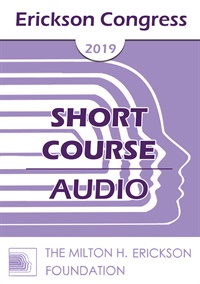
- Average Rating:
- Not yet rated
- Topic Areas:
- Short Courses | Core Competencies of Ericksonian Therapy | Seeding | Hypnosis | Psychotherapy | Ericksonian Hypnosis and Therapy Techniques
- Categories:
- Erickson Congress | Erickson Congress 2019
- Faculty:
- Julio Juanes Rubert, LP, MA
- Duration:
- 1 Hour 15 Minutes
- Format:
- Audio Only
- Original Program Date:
- Dec 12, 2019
- Short Description:
- The ability that Dr. Milton Erickson had for “reading the patient” and get information from them in order to build a context in which change was easy to obtain is an area that has been often overlooked due to the difficulty to understand the process that he was using. In what way was he carefully observing the patient to gain personal information from them? Several techniques will be listed and demonstrated in order to become an observant and strategic therapist.
- Price:
- $15.00 - Base Price
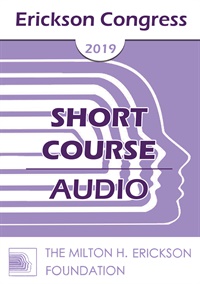
- Average Rating:
- Not yet rated
- Topic Areas:
- Short Courses | Abuse | Post-Traumatic Stress Disorder (PTSD) | Psychology | Psychotherapy | Trauma
- Categories:
- Erickson Congress | Erickson Congress 2019
- Faculty:
- Patrick McCarthy, MBCHB
- Duration:
- 1 Hour 19 Minutes
- Format:
- Audio Only
- Original Program Date:
- Dec 12, 2019
- Short Description:
- This exercise allows people to park all of their problems without any disclosure of their problems. Complete privacy. There is no need to discuss thir problems at all. The micro-structure of the session will be explored to show the various safety devices used. This astonishing exercise can be used for PTSD, abuse, trauma, losing car keys, financial concerns, i.e. absolutely anything! It received a great reception at the ISH meeting in Montreal.
- Price:
- $15.00 - Base Price
Tags: Abuse Psychology Psychotherapy PTSD Trauma
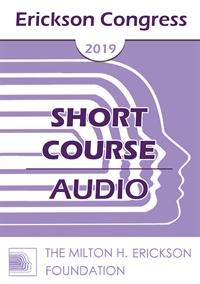
- Average Rating:
- Not yet rated
- Topic Areas:
- Short Courses | Art and Creativity | Hypnotherapy | Psychotherapy | Therapeutic Relationship | Therapist Development
- Categories:
- Erickson Congress | Erickson Congress 2019
- Faculty:
- Richard Hill, MBMSc, MEd, MA
- Duration:
- 1 Hour 30 Minutes
- Format:
- Audio Only
- Original Program Date:
- Dec 12, 2019
- Short Description:
- Hypnotherapy and psychotherapy have been developing over time through various phases. Directive therapies with an intervention orientation have shifted over the years to suggestive and client centered approaches. More recently both research and practice has opened our minds to relational and responsive approaches. The concept of “client responsiveness” is discussed in my book with Ernest Rossi, The Practitioner’s Guide to Mirroring Hands.
- Price:
- $15.00 - Base Price
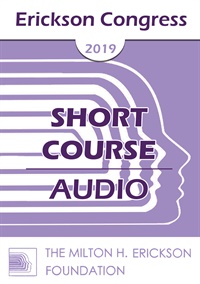
- Average Rating:
- Not yet rated
- Topic Areas:
- Short Courses | Affect | Psychotherapy | Therapist Development
- Categories:
- Erickson Congress | Erickson Congress 2019
- Faculty:
- Bardia Monshi, PhD
- Duration:
- 1 Hour 26 Minutes
- Format:
- Audio Only
- Original Program Date:
- Dec 12, 2019
- Short Description:
- Effective therapy, or coaching, is touching and moving clients. As professionals, we are providing an emotional service because all of our clients’ problems have to do with emotional self-regulation. Therefore, to make therapy effective the impact must be affective!
- Price:
- $15.00 - Base Price
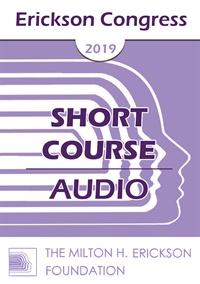
- Average Rating:
- Not yet rated
- Topic Areas:
- Short Courses | Ericksonian Hypnosis and Therapy Techniques | Group Therapy | Hypnosis | Dialectic Behavior Therapy (DBT) | Group Psychotherapy | Psychotherapy
- Categories:
- Erickson Congress | Erickson Congress 2019
- Faculty:
- Malvina Tsounaki, MS
- Duration:
- 1 Hour 14 Minutes
- Format:
- Audio Only
- Original Program Date:
- Dec 12, 2019
- Short Description:
- This short course will present the systemic, dialectic, multilevel, multifocal, model of group therapy utilized at the Institute of Anthropos in Athens, Greece. The approach is influenced by Ericksonian methods and additional techniques from other perspectives have been added.
- Price:
- $15.00 - Base Price
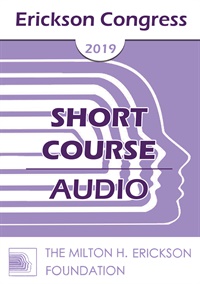
- Average Rating:
- Not yet rated
- Topic Areas:
- Short Courses | Pain and Healing | Sex and Sexuality | Multicultural | Psychotherapy
- Categories:
- Erickson Congress | Erickson Congress 2019
- Faculty:
- Mitra Rashidian, PhD | Robert Jaffe, PhD, LMFT
- Duration:
- 1 Hour 27 Minutes
- Format:
- Audio Only
- Original Program Date:
- Dec 12, 2019
- Short Description:
- According to research (Rashidian et al. 2015), Genito-Pelvic Pain/Penetration Disorder ‘Vaginismus’, causes significant sexual challenges for groups of sub-population women in the US. This workshop provides raw data and statistical analysis, supporting the hypothesis that these women experienced sexual pain as a manifestation of biopsychosocial conditions, resulting from cultural orientations. These include the cultural do’s and don’ts that shapes sub-population women’s sexual beliefs and attitudes, as a result of their life experiences within their cultures, impacting emotional and physical sexual experiences negatively.
- Price:
- $15.00 - Base Price
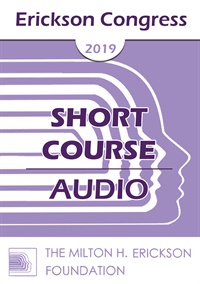
- Average Rating:
- Not yet rated
- Topic Areas:
- Short Courses | Experiential Therapy | Psychotherapy | Therapist Development
- Categories:
- Erickson Congress | Erickson Congress 2019
- Faculty:
- Robert Staffin, PsyD, ABPH
- Duration:
- 1 Hour 30 Minutes
- Format:
- Audio Only
- Original Program Date:
- Dec 12, 2019
- Short Description:
- Often, being dubbed a "master" means that what the teacher does cannot be done by others. However, a cornerstone of Jeffrey Zeig's lifelong quest has been to demystify, annotate, and democratize Milton H. Erickson's work and then his own. In this session, the presenter will map the breadth and scope of Zeig's work, which he has augmented by integrating a theoretical and experimental corpus with the most effective practices of the arts: film, music, theater, literature, and dance.
- Price:
- $15.00 - Base Price
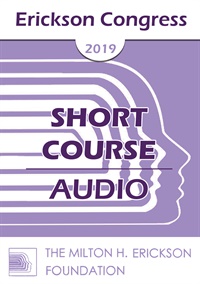
- Average Rating:
- Not yet rated
- Topic Areas:
- Short Courses | Children and Adolescent Therapy | Ericksonian Psychotherapy | Psychotherapy | Ericksonian Hypnosis and Therapy Techniques | Family Therapy
- Categories:
- Erickson Congress | Erickson Congress 2019
- Faculty:
- Maria Escalante de Smith, MA
- Duration:
- 1 Hour
- Format:
- Audio Only
- Original Program Date:
- Dec 12, 2019
- Short Description:
- Ericksonian Psychotherapy emphasizes the importance of utilization. When treating children, as therapists, we need to keep in mind that we also need to utilize whatever happens during therapy whether that can be a given behavior, if the child brings a toy for the consultation, their likes and also provide them with a wide array of resources they can access during therapy.
- Price:
- $15.00 - Base Price
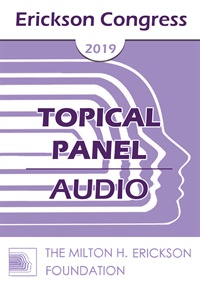
- Average Rating:
- Not yet rated
- Topic Areas:
- Topical Panels | Meditation, Spirituality and Yoga | Psychotherapy
- Categories:
- Erickson Congress | Erickson Congress 2019
- Faculty:
- Bette Freedson, MSW | Paul Leslie, Ed.D. | Robert McNeilly, MBBS | Scott Miller, PhD
- Duration:
- 55 Minutes
- Format:
- Audio Only
- Original Program Date:
- Dec 14, 2019
- Short Description:
- Psychotherapy did not start with Freud. Although largely forgotten, its origins can be directly traced to traditional healing practices (e.g., mesmerism, mind curers, the occult). In the age of science, healing has been reduced to prescriptions for changing people’s thoughts, feelings, behaviors, emotions, or brain chemistry. Lost in translation are the many ways clients’ cultural and spiritual beliefs and practices can, according to research, improve engagement and outcomes.
- Price:
- $15.00 - Base Price
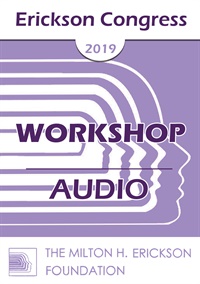
- Average Rating:
- Not yet rated
- Topic Areas:
- Workshops | Hypnosis | Psychotherapy | Storytelling | Utilization
- Categories:
- Erickson Congress | Erickson Congress 2019
- Faculty:
- Marc Oster, PsyD
- Duration:
- 1 Hour 58 Minutes
- Format:
- Audio Only
- Original Program Date:
- Dec 13, 2019
- Short Description:
- Mr. Miyagi (The Karate Kid, 1984) taught his student, Daniel many things. Among them, things are not always as they seem and about functionality. Simple day-to-day activities can also be karate moves, which Daniel wanted to learn. Milton Erickson, a Western version of Mr. Miyagi, introduced us to his concept of utilization in psychotherapy, or functionality. So important was this discovery that the concept of utilization is now a part of virtually every form of talk therapy and healthcare fields in general; it is now common sense.
- Price:
- $15.00 - Base Price
Please wait ...

